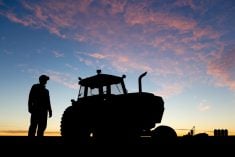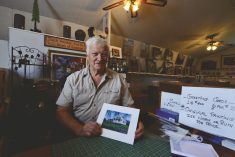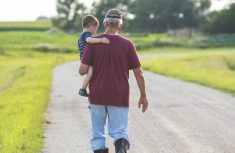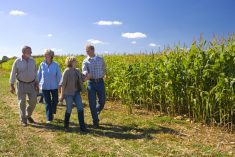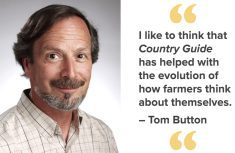Some people can’t wait to retire. They have plans to replace the daily grind with more volunteering, more travel, more golf, more time with the grandkids, more time at the cottage, or whatever it may be that they don’t have the time to do now.
But for others the thought of retirement is terrifying because they have always been defined by, and found purpose in, their career and they don’t know how to replace that if they stop doing what they are doing.
Farmers often fall into the latter category, and, unfortunately, although there are a ton of advisors and experts who can help them sort out the legal and financial aspects of retirement or farm transition, there aren’t many professionals who can assist them with the emotional and life-planning aspects of retirement from the farm, which has been their life’s work.
Susan Latremoille is one of those professionals. After spending more than 35 years in the wealth management industry assisting clients to plan financially for their retirements, she realized that having enough money to retire was only a piece of the retirement puzzle. It was the non-financial side that had the greatest impact on a successful retirement.
“It’s not enough to be financially responsible when it comes to planning for your future,” she says. “You must also design a life that complements who you are as a person so that you can experience fulfillment.”
Develop a life portfolio

Latremoille founded a retirement consulting company, SuccessDNA, to focus on helping people approach retirement better, in particular by helping them to develop what she calls a life portfolio.
Using an assessment tool called Successfinder, she first helps to identify a person’s interests, traits and aptitudes.
“The assessment goes beneath their consciousness to find how they’re really made up,” she says. “That’s why I call it rewiring, not retiring, because our behaviour is hardwired into us, and what you should be doing with your retirement is based on who you are.”
“Just like you have a financial portfolio with different asset classes, you need a life portfolio that’s comprised of all the different activities and parts of your life such as family and friends, purpose and meaning, values, community, social and health. It’s about paying attention to each and every one of those aspects of your life portfolio to make sure that you are on track in every area.”
Read Also

The big squeeze: How to be fair to siblings during farm succession
Managing sibling business relationships on family farms.
Latremoille’s goal is to stand in the gap between who a person is now and the uncertainty of who they are about to become, and she believes with the right strategy and a willingness to move beyond societal stereotypes, retirement can be one of the most exciting and rejuvenating times of their lives.
As a member of the Retirement Coaching Association and a graduate of the Family Enterprise Advisor program, she has worked with many family businesses, including farms, which she has a special soft spot for, having grown up on a farm near Peterborough, Ont., and having an active farming brother and nephew.
The issue of succession planning is highly complicated for farmers today and the process consumes so much time and energy that retiring farmers seldom think about themselves or what they are going to do post-farming.
When she meets a farmer who has finally built the succession plan for the next generation, she asks them, “So now what?”
“I say, what are you going to do now … I caution business owners from being so caught up in the ‘deal’ that they neglect their own well-being in retirement.”
Avoid the retirement honeymoon
Often, when people first retire there is a honeymoon period when they’re simply happy they no longer have to get up at night to check the cows, or lay in bed worrying about how they can possibly do everything tomorrow that they absolutely have to do.
But the honeymoon doesn’t last.
“The retirement honeymoon is not a permanent state,” says Latremoille. “Beyond it, you have to fill your time with something meaningful.”
It isn’t enough to just think retirement means having the time to do all the things you didn’t have time for during your busy farming years. “The reality is that there are 21 time periods in the week — morning, noon and night, seven days a week — that they need to occupy with something, and if they don’t have a plan, pretty soon that’s a lot of time that doesn’t have fulfillment or activity associated with it,” says Latremoille. “So, when I hear somebody saying, ‘Oh I’m just going to relax or I’m going to babysit my grandchildren.’ I get worried… it needs way more attention than that.”
Some people want to stay connected to agriculture and there are many ways to do that in today’s world, like serving on commodity or marketing boards, helping with 4-H, or mentoring, teaching or helping to guide new research. Others may want to change things up completely and never get on a tractor again.
“It’s asking are you satisfied with where you are now? And what’s your vision for what will make you satisfied? Then, what actions do you need to take to get there?” says Latremoille.
What doesn’t help is the way that media and advertisers promote retirement as the grey-haired couple walking along the beach holding hands and living happily ever after.
“It’s truly a myth,” says Latremoille. “Unless you have purpose, activity and involvement, you will soon feel isolated, alone and purposeless, and then your health declines, your energy goes down and your life doesn’t turn out very well at all.”
It’s also not fair to bury your head in the sand and hope you can farm until you drop, says Latremoille. “Some people say, ‘I never want to retire,’ but it’s irresponsible, if you’re a farmer and own property and land, to just die with your boots on because it leaves your heirs clueless as to what should happen next,” she says. “It’s only responsible that they take part in those difficult conversations and decisions in the retirement piece.”
Where do you start?
So, where do farmers start in planning to fill the hours beyond the farm? Well, you can try the do-it-yourself approach.
Latremoille has written two books: The Rich Life: Managing Wealth and Purpose and It’s Not Just About the Money: The Whole-Life Approach to Wealth Management, and she says the first step for many farmers seeking non-financial retirement help is to sound out their financial advisor.
“Test the waters with your financial advisor. If they have the right mindset, they can help you to a certain extent. If they don’t have the right mindset, then separate the financial issues from the other and contact the Retirement Coaches Association or me and I can put them in touch with someone,” says Latremoille.
If a farmer wants to try the do-it-yourself approach, she recommends they get a copy of Your Happiness Portfolio for Retirement: It’s Not About the Money! Making Retirement the Best Time of Your Life by Marianne Oehser, which is a sort of do-it-yourself manual.
“If someone does want to do it on their own, this book is comprehensive and at the end of every chapter, there are self-paced exercises and take-aways,” says Latremoille.
She emphasizes, however, that, in many cases it’s like having an exercise program, which is much easier and effective with a personal trainer or coach who is aware of the pitfalls and can keep people on track. “I believe that personal connection can be beneficial in many cases,” she says.
More retirement advisors needed
Latremoille is trying to encourage more financial advisors to get involved in the non-financial aspect of retirement planning with their clients, because it’s an area where there is a huge need and very little capacity at the moment.
There are only two accreditation programs in North America for non-financial retirement coaching: one is through the Retirement Coaches Association and the other with Retirement Options. “It’s an industry that is in its infancy, and although there is beginning to be recognition of the importance of the non-financial side of retirement planning, it still has a long way to go. There are not enough retirement coaches to go around,” says Latremoille, who is also out to change that.
“I encourage financial advisors to take notice here and think about their farm clients from a more holistic perspective and help them either learn more about it, or better still, partner with a retirement coach because they have enough to do with the financial side of things,” says Latremoille.
It’s also important that families communicate, are involved and help support the retirees in their lifestyle choices and understand how difficult the decision to retire can be for many farmers.
“There’s no substitute for communication whatever business you’re in,” says Latremoille.
“Often, we see the next generation saying, ‘I can’t wait for Mom and Dad to move out so I can get new technology and do it my way.’ It’s a family dynamic regardless of what the business is. I think that speaks to the role that a Family Enterprise Advisor can play in helping business families think through the many decisions they have to make concerning succession and the transfer of businesses to the next generation or the sale to a third party.”
For most business owners, their business is their baby and farmers are the same, and to think that anything bad would happen would break their heart. “They’ve invested so much of themselves, their lives, blood, sweat and tears into it, it’s a lifestyle and a community as well,” she says.
When there is co-operation and consideration from everyone involved in the retirement process — because it’s never just about the individual or couple who are retiring — Latremoille has seen some highly creative and successful retirements.
Retirement is simply another phase of life, and if someone has cultivated interests along the way in their other life phases, it often presents an opportunity to explore them more fully, or to develop new ones. It’s a process that is lifelong for many, but the key is to figure things out ahead of time and not let yourself go through the retirement honeymoon and then crash, says Latremoille.
“I know somebody who was keen on a particular breed of dog, and they ended up breeding dogs after they finished farming, so it’s still related, it’s still husbandry of animals in some respect, but it was completely different than milking cows,” says Latremoille. “But it lends itself to living in the country, having a passion for animals and being able to make money at it too.”





